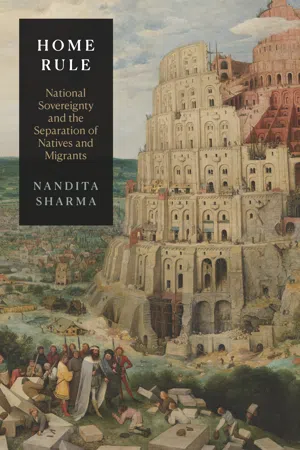
- English
- PDF
- Available on iOS & Android
eBook - PDF
About this book
In Home Rule Nandita Sharma traces the historical formation and political separation of Natives and Migrants from the nineteenth century to the present to theorize the portrayal of Migrants as "colonial invaders." The imperial-state category of Native, initially a mark of colonized status, has been revitalized in what Sharma terms the Postcolonial New World Order of nation-states. Under postcolonial rule, claims to autochthony—being the Native "people of a place"—are mobilized to define true national belonging. Consequently, Migrants—the quintessential "people out of place"—increasingly face exclusion, expulsion, or even extermination. This turn to autochthony has led to a hardening of nationalism(s). Criteria for political membership have shrunk, immigration controls have intensified, all while practices of expropriation and exploitation have expanded. Such politics exemplify the postcolonial politics of national sovereignty, a politics that Sharma sees as containing our dreams of decolonization. Home Rule rejects nationalisms and calls for the dissolution of the ruling categories of Native and Migrant so we can build a common, worldly place where our fundamental liberty to stay and move is realized.
Frequently asked questions
Yes, you can cancel anytime from the Subscription tab in your account settings on the Perlego website. Your subscription will stay active until the end of your current billing period. Learn how to cancel your subscription.
No, books cannot be downloaded as external files, such as PDFs, for use outside of Perlego. However, you can download books within the Perlego app for offline reading on mobile or tablet. Learn more here.
Perlego offers two plans: Essential and Complete
- Essential is ideal for learners and professionals who enjoy exploring a wide range of subjects. Access the Essential Library with 800,000+ trusted titles and best-sellers across business, personal growth, and the humanities. Includes unlimited reading time and Standard Read Aloud voice.
- Complete: Perfect for advanced learners and researchers needing full, unrestricted access. Unlock 1.4M+ books across hundreds of subjects, including academic and specialized titles. The Complete Plan also includes advanced features like Premium Read Aloud and Research Assistant.
We are an online textbook subscription service, where you can get access to an entire online library for less than the price of a single book per month. With over 1 million books across 1000+ topics, we’ve got you covered! Learn more here.
Look out for the read-aloud symbol on your next book to see if you can listen to it. The read-aloud tool reads text aloud for you, highlighting the text as it is being read. You can pause it, speed it up and slow it down. Learn more here.
Yes! You can use the Perlego app on both iOS or Android devices to read anytime, anywhere — even offline. Perfect for commutes or when you’re on the go.
Please note we cannot support devices running on iOS 13 and Android 7 or earlier. Learn more about using the app.
Please note we cannot support devices running on iOS 13 and Android 7 or earlier. Learn more about using the app.
Yes, you can access Home Rule by Nandita Sharma in PDF and/or ePUB format, as well as other popular books in Social Sciences & World History. We have over one million books available in our catalogue for you to explore.
Information
Publisher
Duke University Press BooksYear
2020Print ISBN
9781478000952, 9781478000778eBook ISBN
9781478002451Table of contents
- Cover
- Contents
- Acknowledgments
- 1. Home Rule: The National Politics of Separation
- 2. The Imperial Government of Mobility and Stasis
- 3. The National Government of Mobility and Stasis
- 4. The Jealousy of Nations: Globalizing National Constraints on Human Mobility
- 5. The Postcolonial New World Order and the Containment of Decolonization
- 6. Developing the Postcolonial New World Order
- 7. Global Lockdown: Postcolonial Expansion of National Citizenship and Immigration Controls
- 8. National Autochthonies and the Making of Postcolonial National-Natives
- 9. Postseparation: Struggles for a Decolonized Commons
- Notes
- Bibliography
- Index